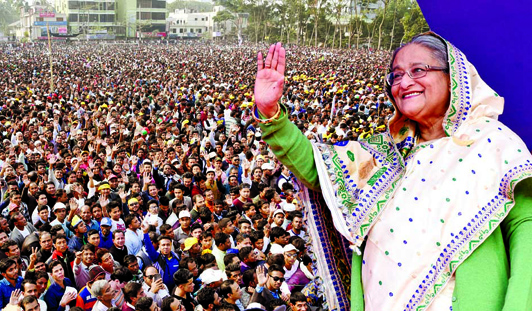DHAKA, April 30, 2018 (BSS) – With the election approaching, the Awami League and it’s President Shiekh Hasina’s approval rating has marked a sharp rise while the rating for BNP and its key ally Jammat suffered a blow, according to a report released by USA based International Research Institute (IRI).
Riding on the back of ‘development achievements’ and ‘the popularity of its leader,’ AL enjoys support from majority of the people but the BNP and Jamaat is likely to “face strong headwinds entering the 2018 election cycle because of their association with violence, intransigence and religious extremism”, according to the report.
The report is based on a series of focus group discussions (FGDs) conducted by IRI in eight divisions with each group having eight participants at least over the summer of 2017.
However, economic security and corruption were cited by most as their pressing concerns, although interestingly many did not blame the government for their economic situation.
On this aspect, IRI analyses the findings thus: “Bangladeshis appear to have a strong and deeply personal dedication to the Awami League and its leader, Sheikh Hasina. Two key factors seem to drive this: targeted local development and the history of Sheikh Hasina and her party. This combination of emotive policy-based support appears to provide the Awami League with a resilient base of support.”
Behind the rise in the popularity of the AL chief Sheikh Hasina, the report finds she work and stance for making lives better for the country men.
Participants praised Sheikh Hasina for her actions on women’s rights, better education, leadership, and being personally educated and patriotic. Comments on Sheikh Hasina from FGD participants included the following, among others: “When I remember her (Sheikh Hasina), I remember the development of the country” (Man from Khulna); “I like her as she stands beside the poor” (Woman from Mymensingh); “Sheikh Hasina means Bangabandhu and Bangabandhu means liberation war” (Urban woman in Mymensingh).
And the sordid picture for BNP is largely attributed to the “corrupt image” of its acting chief Tarique Rahman and to the dismal track record that Jamaat draws for its “anti-liberation role” and indulgence in “communal politics and violence”.
Some of the comments from the FGD participants on BNP and Khaleda Zia included a highly negative perception about Tarique Rahman, Khaleda Zia’s son, convicted of multiple crimes, and currently acting chief of BNP: “I personally believe that BNP belongs to Khaleda Zia, so there is no democracy. The party will be pressured by what Tareq Zia will order…” (Man from urban Dhaka); “The son of Sheikh Hasina is highly educated, but the son of Khaleda, Tareq Zia is incendiary” (Man from rural Mymensingh). Comments on BNP also centered on violence. “I feel fear when I hear BNP” (Woman from rural Khulna).
Comments on Jamaat were mostly negative, such as: “Jammat-e-Islami is not Islamic. Their works are not Islamic. Islam is peaceful, but they aren’t…” (Man from urban Dhaka); “Now our country is going properly. Women are contributing in every sector. But if Jammat comes to power, they will create a hindrance for women…” (Woman from urban Mymensingh). Other critical comments on Jamaat centered on the party being a Pakistani party, criminal, communal, and did not respect the liberation of Bangladesh or Bangabandhu Sheikh Mujibur Rahman.



